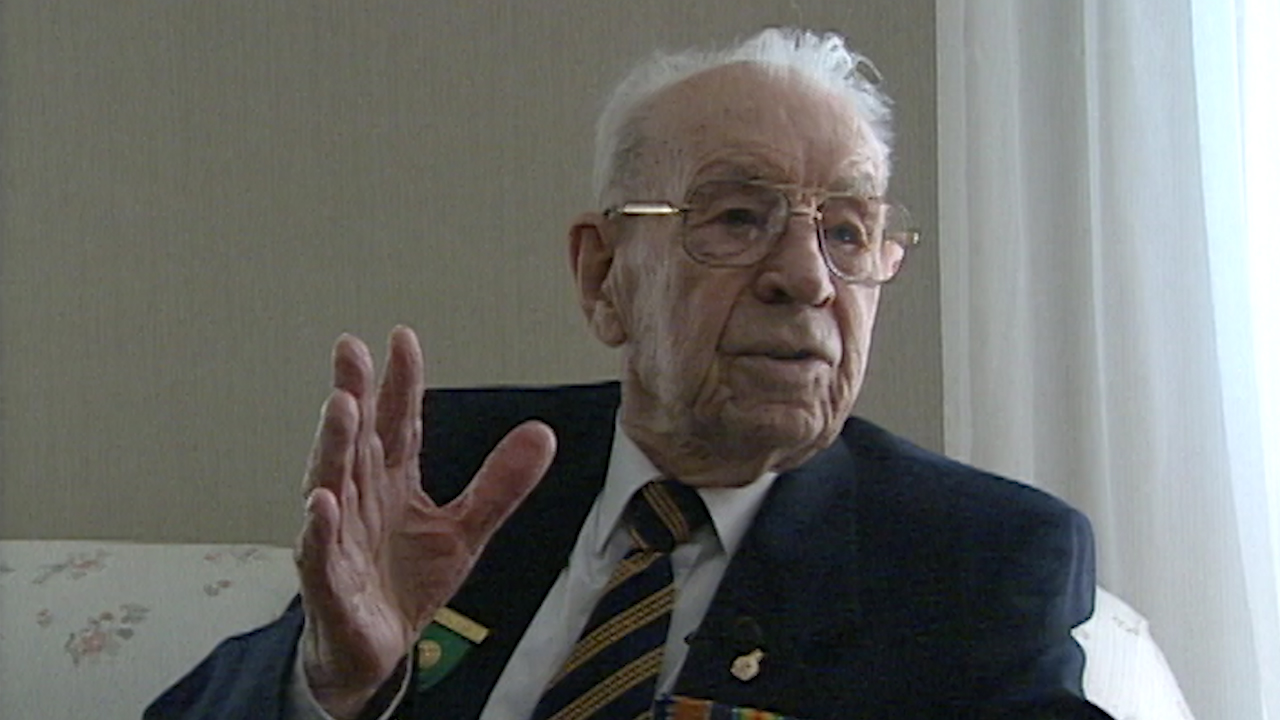Trenches
Heroes Remember
Trenches
Transcript
Interviewer: What was the day to day conditions like in the
trenches?
Well sometimes it wasn't too bad you know. It wasn't all up to your
neck in mud and all this what they say. We treated our trenches
as our home. We kept it clean and looked after it and had little
funk holes dug in the trenches and you'd have candles in there to
give you a little bit of light in the dark. You'd have pictures,
some of the boys would have pictures stuck up in their funk
holes as we called them.
Interviewer: Really.
Yeah so it wasn't all muck and grime as some like to make out it
was. But... lots of times it was really tough. We had our good
times too. Lots of times you went in to the line for 6 days you
know and you wouldn't have a casualty. Another time you'd got in
and by golly you'd have a bunch killed and wounded and that.
Interviewer: What was the morale like amongst the soldiers, the
Canadian soldiers?
Well I'll tell ya they were the best, they were the best trained
soldiers there was.Interviewer: Really? Yes. They were all volunteers.
Interviewer: That's right.
You see that makes a big difference. The German were good
soldiers. But a machine gun crew of Germans they'd fire at ya
and try to kill ya but when you caught up with them and got them
they always got on their knees and say mercy comrade, mercy
comrade.
Interviewer: Really, did you take any prisoners your self?
Yes. I, that means it was a war cobra for a battle we went 5
kilometres that morning, we had no opposition. We suffered more
at night when we laid out in front of the trenches. Cause he was
shelling our trenches. So we... we kept on going there for 5
kilometres you know. That was wonderful for them days you
know... The commanding officer was moved up from where his
headquarters was into the new billets, some of the land we'd
taken from the Germans. And we uh, we... Oh the commanding
officer wanted all the, the billets and that cleaned. Billets
houses and that to see if there was no prisoners and that. So
Millie and I, that was my running mate, we used to run lines
together. Fixing our signalling wires we used to run together
two at a time like, two go together. We were on this road, we
looked down the road and there comes this German right up the
road. So we waited for him to get there and Gerry, my pal, had a
rifle on him in case he made any false move. And I searched him
and he didn't have anything on him. (No?) No, all he could and
then all of a sudden he started to speak English. And he said
I'd like a cigarette, well you couldn't say no we gave him a
cigarette, sure. So that was the time we got a prisoner. We
marched him in to the ordering room to our Colonel said there's
your prisoner.
Description
Mr. Fitsell recalls life in the trenches and gives an account of the capture of a German prisoner of war.
John Fitsell
John Fitsell was born in Hastings, England on August 11, 1898. He came to Canada in 1912 and enlisted in Barrie, Ontario with the 157th Battalion at the age of 15 years. He told the recruiting officer that he was 16. After completing basic training, he sailed to England and in three months was in the trenches of France.
Meta Data
- Medium:
- Video
- Owner:
- Veterans Affairs Canada
- Duration:
- 03:34
- Person Interviewed:
- John Fitsell
- War, Conflict or Mission:
- First World War
- Branch:
- Army
- Units/Ship:
- 157th Battalion
Related Videos
- Date modified:




